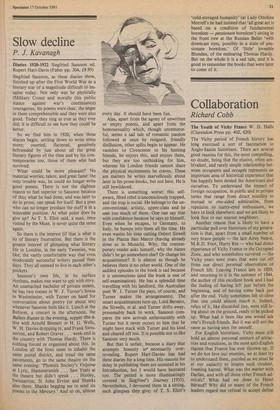Slow decline
P. J. Kavanagh
Diaries 1920-1922 Siegfried Sassoon ed. Rupert Hart-Davis (Faber pp. 304, £9.95) Siegfried Sassoon, as these diaries show, finished up after the First World War as a literary star of a magnitude difficult to imagine today. Not only was he physically (Military Cross) and morally (his public stance against war's continuance) courageous, his poems were clear, the anger in them comprehensible and they were also good. Today they ring as true as they ever did; it is difficult to see how they could be better.
So we find him in 1920, when these diaries begin, settling down to write some more; courted, flattered, genuinely befriended by just about all the great literary figures of the time and by his contemporaries too, those of them who had survived.
What could be more pleasant? No material worries, talent, and great fame: the only trouble was, he could no longer write good poems. There is not the slightest reason to feel superior to Sassoon because of this; what he had done, and was later to do in prose, can speak for itself. But a poet who can no longer produce the stuff is in a miserable position. At what point does he give up? As T. S. Eliot said, a man, once visited by the Muse, is never quite the same again.
So there is the interest (if that is what it is) of literary frustration. But there is the greater interest of glimpsing what literary life in London, in the early Twenties, was like; the vastly comfortable way that even moderately successful writers passed their days. They all seemed to live in each other's pockets.
Sassoon's own life, in its surface rhythms, makes one want to spit with envy. An unattached bachelor of private means, he has two rooms in W. J. Turner's house in Westminster, with Turner on hand for conversation about poetry (or about sex) whenever Sassoon feels like it. Lunch at the Reform, a concert in the afternoon, the Ballets Russes in the evening, supper tete-atete with Arnold Bennett or H. G. Wells, W. H. Davies dropping in, and Frank Swinnerton, and Robert Graves. . . week-end in the country with Thomas Hardy. There is nothing forced or organised about this. In London all the lions seem to inhabit the same postal district, and tread the same pavements, go to the same theatre on the same evening: 'Phoenix Society's Volpone at Lyric, Hammersmith . . . Saw Yeats at the theatre but didn't speak . . . Huxley, Swinnerton, St John Ervine and Shanks also there. Shanks begging me to send six Poems to the Mercury.' And so on, almost every day. It should have been fun.
Alas, apart from the agony of unwritten or empty poems, and apart from the homosexuality which, though unremorseful, seems a sad tale of romantic passion followed at once by resigned, friendly disillusion, other splits begin to appear. He vanishes to Cirencester to his hunting friends, he enjoys this, and enjoys them, but they are too unthinking for him, whereas his London friends cannot share the physical excitements he craves. These are matters he writes marvellously about later in his prose-books, but not here. He is still bewildered.
There is something worse; this selfaware, feted rebel is unconsciously trapped, and the trap is social. He belongs to the unconventional, artistic, upper-class and he sees too much of them. One can say that with confidence because he says so himself. Even when he escapes, to Germany, to Italy, he bumps into them all the time. He even wastes his time cutting Osbert Sitwell in the Piazza San Marco (having already done so in Munich). Why, the contemporary reader asks himself, why the blazes didn't he go somewhere else? Or change his acquaintance? It is almost as though he believes there is no other world. One of the saddest episodes in the book is sad because it is unconscious (and the book is one of self-examination). He has a splendid time travelling with his landlord, the Australian poet W. J. Turner (he pays, of course, and Turner makes the arrangements). The smart acquaintances turn up, Lord Berners, the Sitwells, et al. and Turner drifts away, presumably back to work. Sassoon compares the new arrivals unfavourably with Turner but it never occurs to him that he might have stuck with Turner and his kind and cleared off too. It is possible not to like Sassoon very much.
But that is unfair, because a diary that attempts honesty is° necessarily overrevealing. Rupert Hart-Davies has had these diaries for a long time. His reasons for delay in publishing them are unstated in his Introduction, but I would have hesitated too. The period is more illuminatingly covered in Siegfried's Journey (1935). Nevertheless, I devoured them in a sitting, such glimpses they give: of T. S. Eliot's 'cold-storaged humanity' (at Lady Ottoline Morrell's he had insisted that 'all great art is based on a condition of fundamental boredom — passionate boredom') sitting in the front row at the Russian Ballet 'with downcast eyes, possibly in a state of passionate boredom.' Of 'little' loveable Blunden, of the endearing Thomas Hardy. But on the whole it is a sad tale, and it is good to remember the books that were later to come of it.






































 Previous page
Previous page